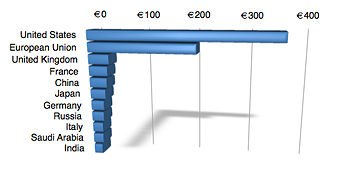* Dirty Laundry in the German Army
Neo-Nazi related incidents in Germany have multiplied
so much in recent years that most crimes no longer
warrant much press coverage in the Fatherland.
Nazism did not die when Hitler’s forces were crushed—it
merely went underground. A host of surveys, violent incidents,
and even recent German government policies confirm it.
When the Berlin Wall crumbled in 1989, the signal to all
underground fascists could not have been more clear. It was
time to resurface. At first, hate crimes were sporadic and
unrelated. But each “success” converted more adherents to
right-wing doctrine. Soon, surveys revealed that many German
citizens even sympathized with certain Nazi views. In fact, in
1997, a European survey revealed that 34 percent of Germans
consider themselves “quite racist” or “very racist.”
In recent years, far-right views have wedged their way into
the highest levels of German government. Recently, another
sector within the German sphere has been tainted by Nazi
influence—the Bundeswehr, or the German Army.

* Fascist Memories in the Balkans
In December 1991, just two years after the Berlin Wall collapsed,
with complete disregard for strong world opinion and for the fate
of the Serbs, Germany adamantly declared full support for the
secession of Slovenia and Croatia from the republic of Yugoslavia.
A violent civil war erupted in Yugoslavia thereafter.
The war in Yugoslavia signaled a new era in the German
Army, which had been dormant since World War II. Between
1992 and 1994, the Germans exported more than $320 million
worth of military hardware to Croatia. In 1995, Germany agreed
to send military transport planes, medical personnel, and other
support to the Balkan combat zone. At that time, however, they
would not send ground troops.
“This would render us part of the problem rather than its solution,” admitted Volker Rühe, the German defense minister.
(Over 700,000 Serbs were massacred
during World War II by the Nazi regime which absorbed
Slovenia into the Third Reich and created a puppet state in
Croatia.) Obviously, Germany knew that any show of force in
the Balkans would make the Serbs extremely nervous.
Yet in 1995, not long after Rühe’s statement, Germany
committed 4,000 troops inside Croatia to help enforce the
so-called peace agreement. It was their first troop deployment
outside Germany since World War II.
At first, Germany’s extended effort in the Balkans seemed
noble. But it wasn’t long before disturbing reports surfaced,
including one where German soldiers in Croatia were heard
chanting “Sieg Heil” and “Heil Hitler.”
Even more unsettling was a video discovered in 1997.
In it, soldiers who were training for their mission in the Balkans
acted out executions and rapes. The question is, how many
soldiers were involved and how many officers knew about
it? The German defense minister and Chancellor Kohl both
insisted that these were only isolated incidents, which is the
same argument they used for other such reports.
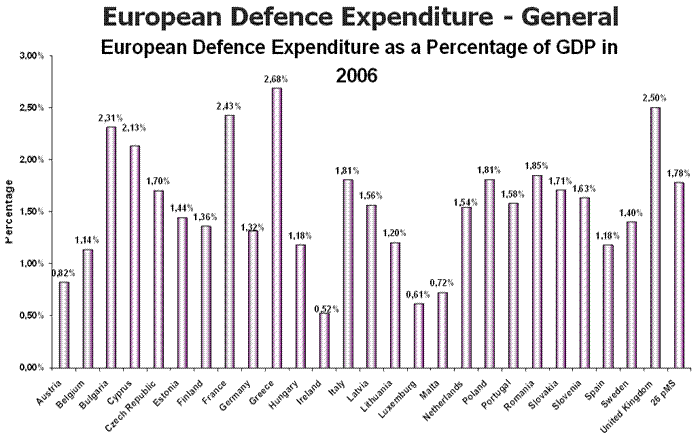
European Defence Expenditure as a
Percentage of GDP.
(click to enlarge) |
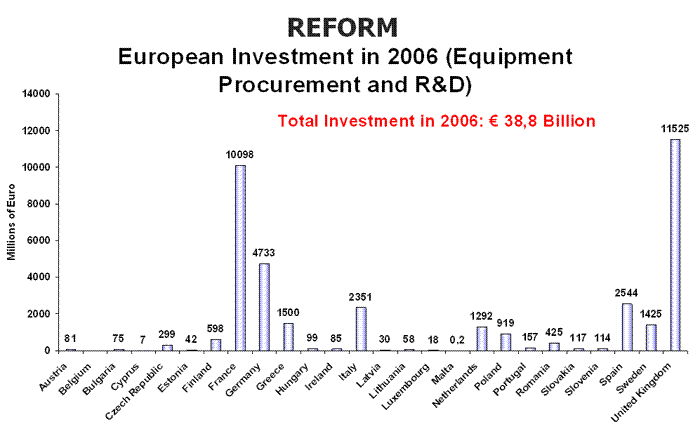
European Investment in 2006 - Equipment Procurement and Research and Development.
(click to enlarge) |
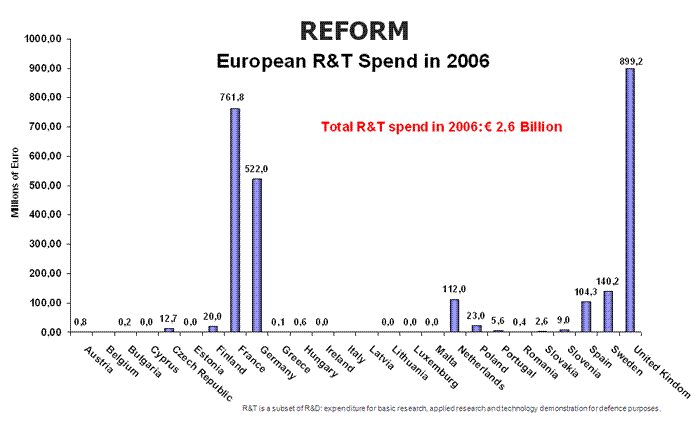
European Investment in 2006 - Research and Technology for Defence Purposes.
(click to enlarge) |

* A Nazi Rally—in the Bundeswehr?
Manfred Roeder is a convicted Nazi terrorist. In 1973, he
wrote the foreword in the book Auschwitz Lie. He set up a
terrorist group which was linked to several bombings in 1980,
including an Italian train station and a Jewish synagogue in
Paris. In 1981, he was convicted for killing two Vietnamese
immigrants in Germany with a fire bomb. The following year, he
was sentenced to 13 years in prison. After his early release in
1990, he again joined extreme right-wing organizations. Roeder
has been linked to a bevy of right-wing activity for nearly 30
years. German intelligence even lists him as a terrorist!
So why was this convicted neo-Nazi bomber invited to speak
to new recruits at an elite officers academy for the Bundeswehr?
Good question. Roeder’s address to the Bundeswehr in May
1995 only became public knowledge in 1997. He spoke about
“ethnic German” Russians residing in Kaliningrad—a Russian
city on the banks of the Baltic. (German nationalists would
like to see the region absorbed into the Fatherland.)
In addition to the speech invitation, Roeder says the
German defense ministry donated a small amount of cash,
vehicles, and other tools to his organization in 1993. The whole
incident has been quite embarrassing for German officials.
They suspended the officer in charge of the academy and
denied any involvement in the decision-making leading up
to the invite. Another “isolated incident.”
The “isolated incidents” have been popping up regularly
in the Bundeswehr for several years now. There were 72
right-wing incidents in the German Army in 1996. This number
had climbed to 135 in 1999 and jumped to 196 in 2000. One
particular outrage occurred in the small German town of
Detmold. Uniformed German soldiers, while shouting “Wogs
out of Germany,” attacked two Turkish immigrants and a
16-year-old Italian boy with baseball bats and knives.
In 1997, the Sunday Telegraph in London quoted Helmuth
Priess, a retired lieutenant-colonel in the German Army. Priess
claims that there are far too many officers in the Army with
right-wing sympathies. He recalled one incident where a
commanding officer told him to stress the importance of a
familiar Nazi motto: “Work makes you free” (a sign bearing
that inscription hung above the entrance to Auschwitz).
Priess was shocked to hear such admonition—and from a
high-ranking officer! He was later startled when he heard the
officer became a general.
More recently, 21-year-old Christian Krause, the son of
a former German minister, told the German newspaper Bild
am Sonntag that he had encountered numerous right-wing
extremists during his ten-month stint in the army. According
to Krause, at his base there were two or three right-wing
incidents a month.
At parties, “There were always toasts made to the führer and after drinking alcohol
many officers would give each other the Hitler salute.…”
German officials continue to downplay neo-Nazi-related
activities within the Bundeswehr. But how much longer can they
keep saying that such events are only “isolated” cases—especially
when statistics reveal an upward trend in violent incidents?
Take a look at the astounding post-World War II success
of certain Elite German Industries identified in a World War II declassified intelligence document.
Elite German Industries
Declassified Intelligence Document
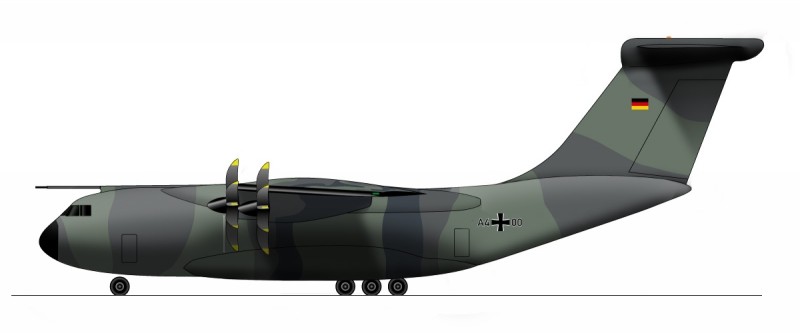
Airbus-A400M still in production - (click to enlarge) |
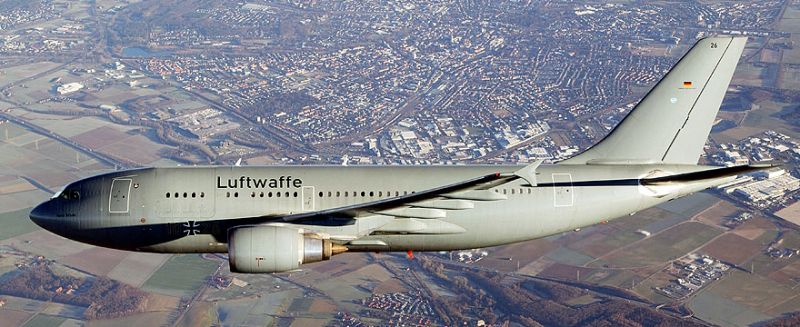
Airbus_A310-MRTT of the German Luftwaffe - (click to enlarge) |

* Southward Expansion
Overseas, Germany is moving ahead, gung-ho, on its grand process of re-colonizing parts once ruled by Deutschland in a previous era when the nation was cloaked in more overtly imperialistic garb.
But intriguingly, away from the home turf it is a different story. Overseas, Germany is moving ahead, gung-ho, on its grand process of re-colonizing parts once ruled by Deutschland in a previous era when the nation was cloaked in more overtly imperialistic garb.
Since unifying in 1990, the German nation has rapidly spread its military forces around many theaters of conflict in all hemispheres. These initiatives have always occurred under the umbrellas of the European Union, NATO or the United Nations, thus avoiding any charge that they are purely German initiatives designed to further German desires for a return to empire.
Track back to Germany’s first “out-of-area operation.” In 1992, the Kohl government sent troops to support the NATO naval blockade of Yugoslavia. Later, following the deployment of troops to the UN Somalia mission in 1994, the German Federal Constitutional Court ruled that German troops could participate in UN peacekeeping operations outside NATO territory.
What is significant about the Balkans blockade was that it was a direct result of Germany triggering the Balkan wars by recognizing Croatia and Slovenia as breakaway nations from the Federal Republic of Yugoslavia in 1991. By 1999, German troops were in combat in support of NATO, engaged in furthering the Balkans conflict. Today, the entire Balkan Peninsula is in process of being turned into a collection of vassal states subservient to a German-dominated EU.
With the destruction of greater Yugoslavia as a political entity, the way was clear for the European Union to impose its will on the Balkan crossroads of Europe, a most strategic piece of territory. The scene was then set for the expansion of German influence, under the EU umbrella, to extend southward via the Adriatic and the Mediterranean seas. Malta (the island that Italian Prime Minister Romano Prodi has called a “stepping stone to Africa”) and Cyprus fell quickly into the EU maw.
Today we find the German Navy patrolling the Mediterranean and the waters off the Horn of Africa. We also see the German military involved in a mock invasion off Africa’s west coast, on the ground in the Congo guarding German mining interests there, and preparing for involvement in the Darfur conflict in Sudan. Added to all this is Germany’s continuing troop presence in Afghanistan, Uzbekistan, Kosovo, Bosnia-Herzegovina, Georgia and off the coast of Australia in East Timor, not to mention (post-9/11), the Luftwaffe having flown security missions for the U.S. covering America’s East Coast! All that increasing global involvement is quite a leap for a united Germany that had its first post-war “out of area” military operations only 14 years ago.
Perhaps if these widespread missions were billed in the media as German initiatives, it might stir some unpleasant memories of previous combat undertaken by Germany some 60 years ago. However, the Germans have been very clever to publicize them as being much-appreciated support to both UN and NATO missions. This bit of pr places a nice gloss on what may emerge as hidden German motives, but step back and view the whole picture: With a wider lens, we may see a Germany in a stunningly expansionary mood, particularly in Africa.
* On to Africa
Once again, akin to the scramble for African resources in the 19th century, the rush is on in Africa.
Increasing German interest there is beginning to highlight the prospect of confrontation between Germany and China, especially in Nigeria, Angola and Sudan. At issue is access to exploitable oil reserves and Africa’s vast mineral wealth. Watch for tensions to rise between China and a German-led EU on these issues.
But of particular note is Germany’s renewed interest in the southwestern African nation of Namibia.
Previously colonized by Germany in the great rush for the rich resources of Africa that took place in the 1800s, Germany’s freshly overt interest in Namibia centers on access to its rich deposits of copper and chrome ore, and, very strategically, on control of the deep-water port of Walvis Bay. This time, unlike most other major port facilities where China has taken the initiative, it seems Germany has the jump on China. Just as the Balkans are the literal crossroads of Europe, Walvis Bay has “developed into the commercial turnstile for all of Southern Africa” (German Foreign Policy, July 3). Walvis Bay offers a faster turnaround for European/African shipping than routing via the Cape to South Africa’s ports. It is the preferred African port of call for German shipping companies.
But there is another issue that raises concern in southwest Africa. Some in Namibia still grumble about the way Imperial Germany treated an earlier generation during their colonial days. This piece of history was publicized as recently as 1985 in a UN report on the subject. Termed the “Whitaker Report,” this was a summary of a UN investigation that proved Germany was responsible for one of the earliest acts of genocide in the 20th century. It was perpetrated in Africa.
To quote details of the specific event noted in part one of that report,
“General von Trotha issued an extermination order; water holes were poisoned, and the African peace emissaries were shot. In all, three quarters of the Herero Africans were killed by the Germans then colonizing present-day Namibia, and the Hereros were reduced from 80,000 to some 15,000 starving refugees.”
The question being raised in southwest Africa is, if the Germans succeed in regaining influence in that region, will history repeat itself?
Securing the Horn of Africa
In February 2002, in the largest deployment of German naval vessels since World War II, the German government dispatched a naval task force to the Horn on a mission that involved the securing of its waters from incursion by terrorists. The Germans stayed. In fact, with the German Navy running security off Gibraltar in the Mediterranean and also off the Horn of Africa, no vessel presently sails through these marine choke points without being under the watchful eye of Germany. This continuing presence of the German Navy at these two crucial sea gates could well develop into a permanent presence for the foreseeable future. Having taken up such positions, it is highly unlikely that Germany will yield them up to any other nation.
* Middle East “Peacemaker”
Ever since Germany unified in 1990, the German Foreign Office has sought to become directly involved in the so-called peace process in the Middle East. Joschka Fischer, foreign minister under the former Schröder government, was particularly aggressive in promoting Germany as a “peacemaker” between the Palestinians and the Israelis. With Fischer now gone from the scene, Germany remains a deeply entrenched entity in the peace process. In the most recent conflict, German intelligence officers have been involved in Lebanon, negotiating for the release of captured Israeli soldiers. In addition, Germany has carved out for itself a role in negotiations with Iran over its development of nuclear weapons.
In respect of the war in Iraq, the former Schröder government made itself unpopular with the White House as it refused outright to aid the U.S. alliance on terror in that initiative. This, despite the same government readily acquiescing to the Bundeswehr’s involvement in Afghanistan. Yet a closer look at Germany’s traditional role in covertly supporting terrorist-sponsoring regimes in the Middle East might explain the reason for this reluctance.
Mark Aarons and John Loftus’s masterful exposé of Vatican-German intrigue, The Unholy Trinity, reveals the following:
“Among the dubious achievements of Nazi science was the invention of Sarin, Tabun and Soman. These nerve gases … were so effective that the same formulae are still in use today …. During the 1970s, U.S. codebreakers found dramatic evidence that West German companies were selling the Sarin secret to several Arab nations ….” Aarons and Loftus allude to the probable involvement of the West German intelligence service (BND) as “a merchant of death for [nations] such as Libya and Iraq.”
It is an intriguing study in itself to consider which nation supplied the technical expertise for Saddam Hussein’s sophisticated web of deep underground bunkers. Why, when the cameras zoomed in on the operating instruction templates affixed to much of the underground equipment, did those instructions display very clearly in the German language? German merchants, bankers and the German secret service have yet much to answer for in their contributions to terror regimes in the Middle East, let alone Albania, Croatia and nations within Africa. German and Austrian armaments are continually turning up in caches of terrorist arms in these countries.
The drug- and gun-running corridor that stretches from Germany via the Balkans across Eurasia and clear on down to Latin America is a well-documented reality. It would be intriguing to investigate connections between current German entrenchment in Afghanistan, presently reaping a bumper drug crop in that country, and the whole web of banking and business houses involved in the clearance of the billions of dollars reaped by the purveyors of addiction via the global drug corridors of the world.
* On Jerusalem’s Doorstep
An expanded UN-sanctioned international military force taking up position in Lebanon has serious implications—implications made even more frightening considering the history of the nation that volunteered to lead this force on the ground—Italy—and that which offered its services to patrol the Lebanese coastline—Germany. Between them, these two nations make up the bulk of the European contingent in Lebanon. Italy’s contribution of 3,000 troops is the largest in the UN force; Germany’s force of 2,400 Navy personnel is the second-largest. Italy is set to take over France’s leadership of the mission in February.
Just what are Italy and Germany up to?
Well, for a start, both are itching to be viewed as serious players on the world stage.
Witness EU involvement in the Middle East peace process since the Madrid conference of 1991. Under former Foreign Minister Joschka Fischer, Germany was particularly aggressive in asserting itself, on behalf of the EU, in the diplomatic process between the Palestinians and Israel. Even Pope John Paul II, in a radio interview given in Poland in the mid-1990s, monitored by one of our European representatives at the time, declared his desire to move his office eventually to Jerusalem.
Military cooperation between Germany and Israel tracks back to the conclusion of secret accords between Franz Josef Strauss, Germany’s defense minister at the time, and his wily contemporary in Israel, Shimon Peres. Negotiations between the two began as far back as 1957. By 1962 they matured into a secret agreement for Germany to supply Israel with armaments and military training for the Israeli Defense Forces.
Foisted off onto the public as Germany’s obligation to “protect Israel” being its due penance for the Holocaust, German Middle East policy is in fact geared to achieving, by diplomacy, trade and military assistance, that which Rommel was denied in battle: the extension of German hegemony into the oil-rich Middle East.
Following the union of East and West Germany in 1990, Germany’s foreign policy has increasingly taken on globalist tendencies—the same tendencies that for some time have characterized its aggressive business strategies. Ever since the Balkan conflicts of the 1990s, that tendency for global hegemony has been steadily reflected in the extension of Germany’s military activities outside the continent of Europe.
Now, with the Israeli war cabinet having endorsed the use of German forces in the UN-mandated efforts in Lebanon, Germany is able to quietly ease into position in the Middle East, a position it will not yield up regardless of the outcome of the Hezbollah/Israel conflict.
By stationing its navy off the coast of Lebanon as part of this latest UN initiative, Germany now has its navy deployed throughout the whole of the Mediterranean, one of the world’s most strategic waterways, from Gibraltar to Suez.
How our failure to learn the lessons of history returns to smack us in the face! The very nations that only 60 years ago fought as a tyrannical fascist/Nazi axis, seeking to seize power over the Middle East, are now literally parked on the northern doorstep of the tiny, embattled nation of Israel, only a short hop from Jerusalem!

Eurocopter Tiger - (click to enlarge) |
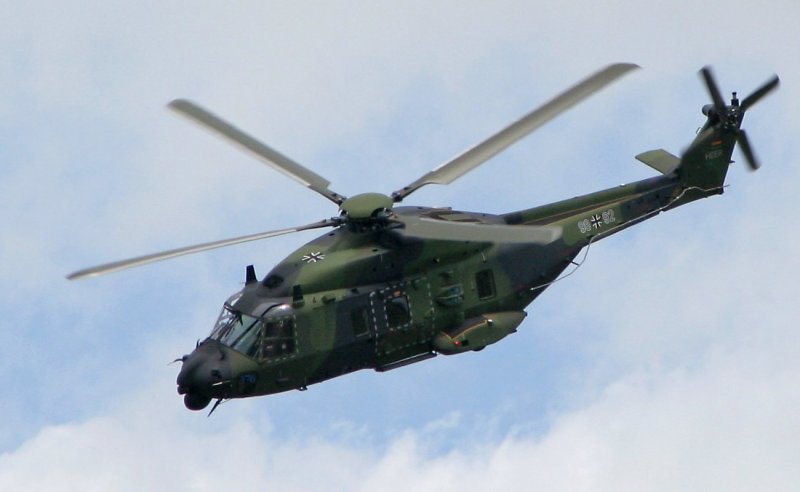
NH-90 ILA - (click to enlarge) |

* Laying Groundwork for Navy
A recently released document revising European Union transport policy provides a glimpse into the future of EU naval forces and has ignited controversy and debate in Britain.
In the document, according to London’s Telegraph, the “European Commission has drawn up plans to set up a European coastguard, which critics fear is a back-door attempt by Brussels to create an EU navy with its own powers to stop and search shipping” (May 21, 2006).
Not sur-prisingly, the plans to redefine Europe’s coastguard were buried deep inside the document among more mundane policy changes.
According to the Telegraph, plans to boost the European coastguard “come on the back of other ‘empire building’ moves by Brussels, including a planned EU army, a common foreign policy and diplomatic service, and a European-wide policy on energy.”
The newly empowered European coastguard would be involved in enforcing maritime law, ensuring passenger safety at sea, and enforcing environmental protection legislation. According to the European Commission, the federalized European coastguard would possess the authority to intercept shipping across all of Europe’s maritime borders and would likely be armed.
In a lead article in May, Lloyd’s List, a British daily newspaper that covers the maritime industry, accused the European Commission of attempting to construct a European navy by stealth.
“[T]he concept of a European coastguard has a federalist charm about it that causes eyes to brighten instantly among gatherings of Europhiles, tired of endless discussions about fish or agriculture,” the newspaper said. “In a way, it is a European navy, by the back door” (May 17, 2006).
Regarding Europe’s plan to bolster its coastguard, Britain’s Shadow Minister for Transport Julian Brazier stated,
“This is very worrying news. It seems the empire-building ambitions of Brussels know no bounds. The drift toward an EU navy must be stopped.”

* Nuclear Aspirations
But of perhaps even deeper concern is the present German government’s tendency to reverse the anti-nuclear power policies of the former Schröder government. At the recent G-8 summit in Russia, Angela Merkel removed Germany’s resistance to endorsing the development of nuclear power as an alternative to more conventional power generation methods. The effect was that all 15 national representatives present were able to reach a unanimous vote on the question.
This may appear innocuous to the casual, non-Green observer. However, the endorsement by Merkel carries with it possibilities that bode ill for the future.
Everyone knows that Iran’s development of nuclear power is, notwithstanding the Iranians’ protestations to the contrary, destined for military use. Yet, why would we not apply the same logic to Germany? Would not the endorsement of the development of nuclear power, ostensibly for “peaceful” purposes, by a German leader be of real concern, especially given the warlike nature of the German peoples dating back to the times of ancient Assyria?
What should motivate us to an even deeper concern at this development in German policy is the probability that Germany has been clandestinely involved in the proliferation of nuclear weapons, while at the same time maintaining a pacifist public face on the subject.
Loftus and Aarons comment on “reports that Western Germany is behind secret proliferation of nuclear weapons.” The authors make the point that the rationale used by the former West Germany to conclude a secret nuclear protocol attached to a trade treaty with Argentina in the 1960s was that the U.S. would at some future date pull out of NATO or withdraw its nuclear shield from Western Europe. During the Cold War, “it was decided to develop the nuclear weapons secretly by utilizing the large émigré communities of German scientists in Argentina and South Africa” (ibid.).
There is, however, a clear difference between Iran’s pursuit of nuclear power and that of Germany. Every sensible observer of the world scene knows that Iran is bent on leading a global crusade to Islamicize the world. Sufficient reliable intelligence exists to confirm that Iran is well advanced along the path toward developing nuclear military capability. The strident diatribes of Iranian leader Mahmoud Ahmadinejad strongly indicate Iran will use every weapon at its disposal to pursue its ends.
With Germany, it is a very different situation in one glaring respect. Germany has been at pains to emphasize its role as a nation that has paid its dues for the millions of victims of two world wars it instigated. Germany has portrayed an image to the world of having become a respectable, even model, peace-loving, Western democracy.
* Germany Invited to Nuclear Club
During World War II, Allied scientists raced against German physicists to be the first to develop an atomic bomb. The Allies succeeded, and Germany was defeated. Today, nuclear-armed France is offering to open its nuclear defense door to neighboring Germany.
In a meeting in Germany on September 10th 2007, French President Nicolas Sarkozy shocked German officials by offering them access to France's nuclear defense system. German Chancellor Angela Merkel and Foreign Minister Frank-Walter Steinmeier declined the offer, with Steinmeier stating that Germany has no intention of becoming a nuclear power.
Still, with this offer, the door is wide open for Germany to begin acquiring nuclear weapons, a possibility that puts many history-conscious pundits ill at ease. The present German administration may not seem interested in accepting the keys to the bomb, but a future administration may be very interested.
|
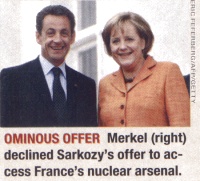 |

* EU Admits Military Use for Galileo
The Galileo satellite radio navigation system, an initiative launched by the European Union and the European Space Agency to ascertain one's precise position in space and time in a reliable manner.
Satellite radio navigation is an advanced technology. Based on the emission from satellites of signals indicating the time extremely precisely. Enables any individual to determine his or her position or the location of any moving or stationary object to within one metre thanks to a small cheap individual receiver.
Galileo is based on a constellation of 30 satellites and ground stations providing information concerning the positioning of users in many sectors.
|
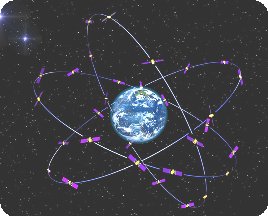 |
In a significant policy shift, the European Commission stated in mid-October 2006 that military uses should be considered for Europe’s Galileo satellite navigational system despite prior commitments to limit its use to civilian applications.
Speaking in Luxembourg, Jacques Barrot, European commissioner for transport, declared that
“the idea of only using Galileo for civilian purposes will not persist into the future because I think that our military cannot do without some sort of [navigation] system.”
In proposing military applications for Galileo, rival to the United States’ Global Positioning System (GPS), Barrot has “crossed a new threshold” that sets the EU “on a collision course with Britain and the United States,” reports the Belfast Telegraph (Oct. 14, 2006). The U.S. originally opposed the project based on the very fact that it could have military uses. Floating the idea will “help to boost the EU’s ambition to develop a larger military capability to back up its foreign policy” (ibid.).
Though billed as an effort to recoup the massive costs of the project, there should be little question that military use for the system was always intended.
“For some EU officials,” London’s Financial Times stated, “Mr. Barrot was simply stating explicitly what they already knew: The end-users of Galileo’s highly sophisticated navigational and mapping systems would almost certainly include the military” (Oct. 14, 2006).
The implications of a European military force guided by the state-of-the-art Galileo, set to become operational in 2008, are no small matter. Consider: America’s GPS has been an important factor in the U.S. being able to maintain its global military supremacy. Soon, Europe will have its own system, even more advanced than GPS. Galileo promises, for instance, to be accurate within one meter, as opposed to GPS’s 10 meters.
* Galileo’s Savior
Europe’s struggling Galileo satellite project may have found its savior: the Continent’s militaries. Modeled after the GPS system in the United States, Galileo was supposed to be up and beaming in 2008, fulfilling its purpose as a solely civilian system. Owing to funding woes, however, the due date for an operational Galileo is now 2012, and instead of just helping find package trucks, it could be guiding cruise missiles.
According to Spiegel Online, Galileo may take on a more openly militaristic face. The ground rules for the Galileo project originally stated it would be for strictly non-military use. Few experts believed Galileo’s projected capabilities reflected purely commercial ambitions, but if the system is truly for civilian use only, one might assume it would be at least partially funded by civilian companies. It is not.
America’s GPS already provides sufficient service to Europeans for free. So, naturally the Continent’s private sector is not investing in a clone of what already exists, with no hope of a profit. Yet the EU continues to push Galileo. Why?
The Register explains, “Galileo only makes sense in the context of European military action and infrastructure security, independent of the U.S.” However, passing off the system as a military project in its beginning stages would have launched zero satellites. “Defining Galileo as a civilian system for Europe was the only way to convince all parties involved to agree to the project in the first place,” said Spiegel Online (June 7, 2007).
Now that private investing has foundered, the European Commission has taken control of the Galileo project.
“European taxpayers will now have to provide the necessary funding. The EU Commission predicts a price tag of €10 billion between now and 2030. This is such a significant sum that tapping into defense budgets suddenly becomes an option” (ibid.).
Of course, the defense ministries will want a return on their money.
From drones flown by remote to troop movements to precision missile strikes, more militaries rely on satellite information today than ever before. While the U.S. allows military use of GPS for its allies, including Europe, the bottom line remains the same: GPS is owned and operated by Washington. A functional Galileo would enable Europe to stand on its own in times of war.
Though this purpose was veiled at the project’s inception, Galileo is now emerging as a war machine.
The European Defense Agency (EDA) received a massive budget increase as plans to enlarge Europe's power militarily and strategically are pushed forward. The EDA is in charge of forging Europe's fractured militaries into a cohesive whole; any money spent on the EDA, therefore, will strengthen Europe's armed services. The EDA's annual budget grew nearly 50 percent to €32 million (us$47 million).
Spending on Europe's Galileo project also increased by €2.4 billion in November 2007. Europe knows a satellite navigation system is a strategic imperative for 21st-century warfare.

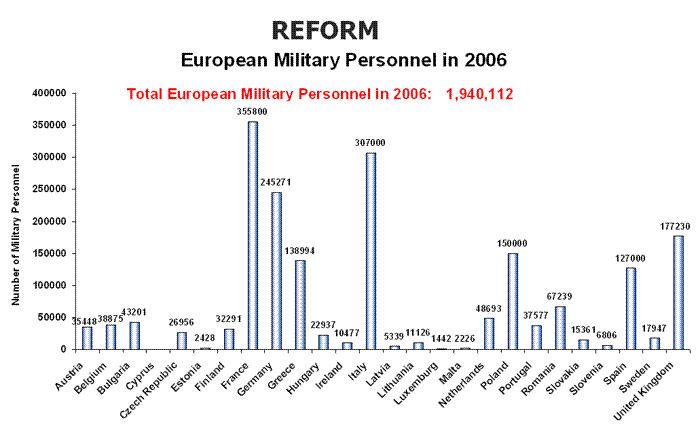
European Military Personnel in 2006 - (click to enlarge) |
* A Force for the Future
Germany finally threw away all semblance of post-World War II remorse with the release of its latest “white paper” on defense. The new policy document removes restrictions on the German military’s foreign and domestic deployment.
“We have gone from a defense army to the army of unity to an army in action,” said Defense Minister Franz Josef Jung when he presented the document on Oct. 25, 2006.
The policy paper outlines the future of the Bundeswehr and defines the foundation of German security policy domestically and internationally.
It is the first of its kind since the federal government released a similar document in 1994. That paper allowed for the German military to be used in foreign theaters. The German government wasted no time implementing it: Within a few years, the world saw the Bundeswehr deploy in the Balkans, Afghanistan, the Horn of Africa and the Congo.
The new white paper takes the recent history of the Bundeswehr into account and delineates a new robust international role for the German military.
It calls for an expansion of the “constitutional framework for the deployment of the armed forces.”
“The national level of ambition is to deploy up to 14,000 service men and women at any one time, distributed over as many as five areas of operations,” the paper states.
This restructuring will facilitate the international peacekeeping role Germany has assumed. Clearly the government expects to keep receiving requests to help resolve international crises—especially as anti-American nations grow more cautious of perceived U.S. imperialism and as the overstretched United States encourages Europe to grow its military.
The white paper opens the opportunity for German troops to deploy virtually anywhere in the world by defining vital German “interests.” These interests include free, unhindered access to world markets and raw materials, and control of any regional crises that could negatively affect Germany’s national security. The paper allows Germany to defend these interests not only through diplomatic and economic means, but also “policing measures as well as military means and, where called for, also armed operations.”
As one of the world’s largest exporters in an economically intertwined world, it wouldn’t be hard for Germany to feel threatened in any of its many markets that span the globe. And as it proved in Africa during World War II, it is quite willing to use armed deployments to safeguard its markets.
Just as it expands the German military’s role internationally, the paper also calls for removing the last shackle of post-war guilt: amending the constitution to allow for Germany’s military to deploy domestically. This constitutional safeguard was created to prevent a politician from using the military to force the government into submission, as Hitler managed to do.
However, faced with the growing terrorist threat, Germany’s “foreign and domestic security can no longer be separated,” said Mr. Jung. In the words of the white paper, “[T]he need for protection of the population and of the infrastructure has increased in importance ….”
If the grand coalition that encompasses all sides of Germany’s political spectrum can adopt a changed constitution, a German government of any composition could amend the constitution in the future, especially with the threat of terrorism bearing down.
The terrorism threat provides a perfect pretext for amending the constitution: The revision would not only satisfy government and military desires, but also salve public fears of Islamist extremism, which have continued to be stoked by the Catholic Church.
It is inevitable that Germany will amend its constitution. The adoption of the white paper shows Germany is quickly moving in that direction.
German leadership is known for taking advantage of crises to further its goals. The timing of this new military policy is an example.
The world can expect a similar result with this white paper as did the 1994 paper: a dramatic increase in Germany’s military deployment around the world.

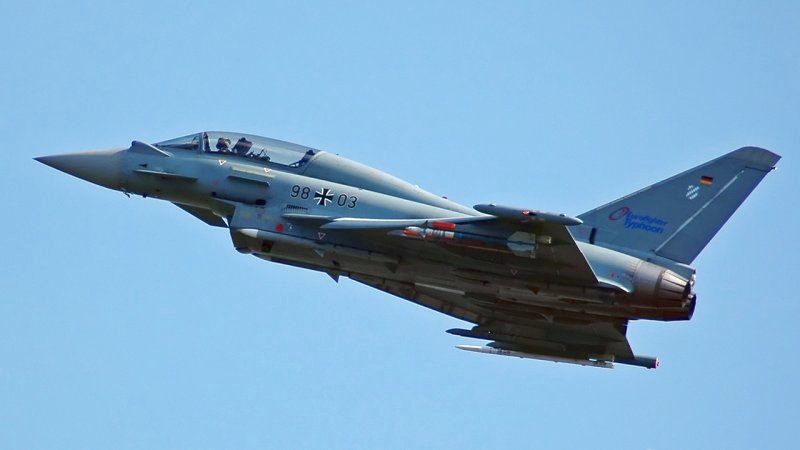
The Eurofighter Typhoon - developed by Britain, Germany, Italy and Spain.
(click to enlarge) |
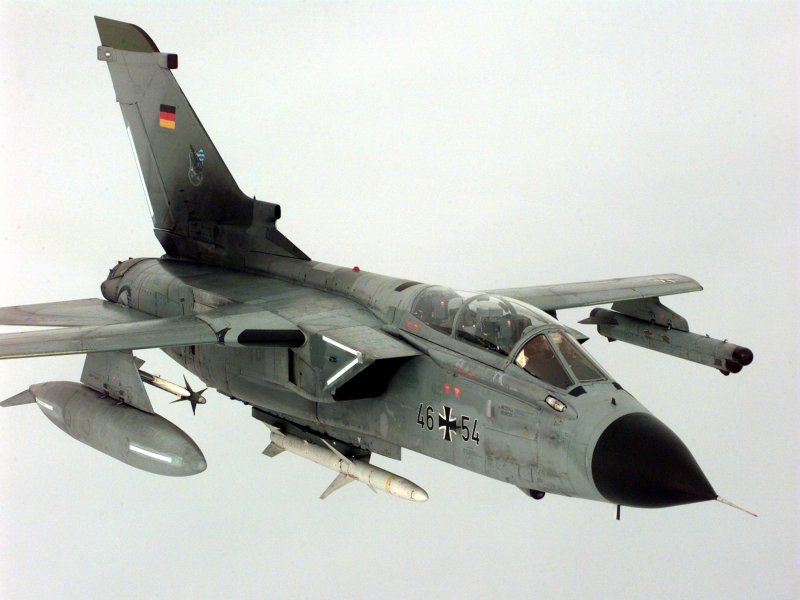
German Air-Force GR4-Tornado - (click to enlarge) |
* Troops Must Learn “How to Kill”
Nato is failing in Afghanistan. The nation is experiencing the worst wave of violence since NATO troops ousted the Taliban in 2001. Reconstruction progress has stalled. The Taliban is gaining strength and the opium drug trade is reaping more profits today than it did before the United States invaded.
Up against these challenges, NATO is looking to Germany to step up and begin shouldering more responsibility.
The southern part of Afghanistan, which sees the fiercest fighting, is patrolled by U.S., Canadian, Dutch and British forces, while the northern, more peaceful region is watched by German troops. German deployment to the north means Germany loses fewer soldiers in combat than other nations. As 2006 wound down, the Afghanistan operation had killed 45 Canadians, 43 Britons and 357 Americans, but only 18 Germans. This gap between German casualties and those of other nations is prompting NATO members to call for Germany to beef up its contribution, which so far has been limited to non-combat roles.
One U.S. official expressed it this way: “The Germans have to learn how to kill” (Spiegel Online, Nov. 20, 2006).
It’s an ironic statement. It is true that modern Germany has been skittish about exercising military power for fear of resurrecting the ghosts of World Wars I and II. It is because of that very history, the capstones of an even more voluminous history of German militarism, that “The Germans have to learn how to kill” makes the ears tingle. As in Lebanon, however, the international community is pressuring Germany to increase its military contribution and assume more responsibility in Afghanistan.
Meanwhile, the Germans are showing themselves increasingly eager to break free of the shackles those negative associations have placed upon them. As reluctant as the Germans have been to accept combat roles in Afghanistan, their defense ministry has planned for such an eventuality, analyzing battle plans that would deploy 1,000 German troops from the north to the south to aid Germany’s allies.
“The upshot,” wrote Spiegel, “is that Berlin may be entering the final phase of its return to the international stage, one in which German soldiers could soon embark on combat missions where they will shoot and be shot at. The question now is whether Germany is ready—emotionally, politically and militarily—for war” (ibid.).
As the cloak of pacifism that Germany has shrouded itself in since the last world war gives way, the world will see that this emerging global power is indeed ready for war.

* Return of the Spies
After lying relatively dormant for 20 years, Germany’s intelligence service is coming alive and showing signs that it is about to undergo a major overhaul.
The most recent sign of the transformation of Germany’s Federal Intelligence Services (Bundesnachrichtendienst, or BND) occurred in mid-November 2006 when construction began on the agency’s impressive new headquarters in Berlin. At a cost of €720 million (us$920 million), the BND’s sleek, sophisticated new facility is the largest state-sponsored construction project since World War II.
Upon completion in 2012, the massive facility is to house 4,000 BND employees, most of whom will be transferred from the present headquarters near Munich. This decision by Berlin to undergo such a large and expensive project (ridiculed as unnecessary by many Germans) reveals the growing importance and attention Germany’s leadership is giving to its intelligence agency and network of spies.
Expatica recently discussed the response by Otto Schily, interior minister during Gerhard Schröder’s chancellorship, to those who oppose the construction project.
“He argues that when flashpoint situations arise in the world, and German citizens’ lives are endangered, the government has to react calmly, but swiftly. With the BND located in Berlin, the lines of communication between the government and the intelligence service are likely to be more effective …” (Nov. 15, 2006).
The relocation of the BND is intended not only to improve this one agency’s efficiency, but also that of the entire German government.
With crises surging across the globe, the demand for Berlin to help manage these issues is intensifying. In recent years, Germany has been deeply involved both politically and militarily in such key arenas as the Balkans, Afghanistan, Eastern Europe, Lebanon, Israel, and throughout Africa. Even the covert role the BND is playing between Israel and Hezbollah. It is a nation in demand.
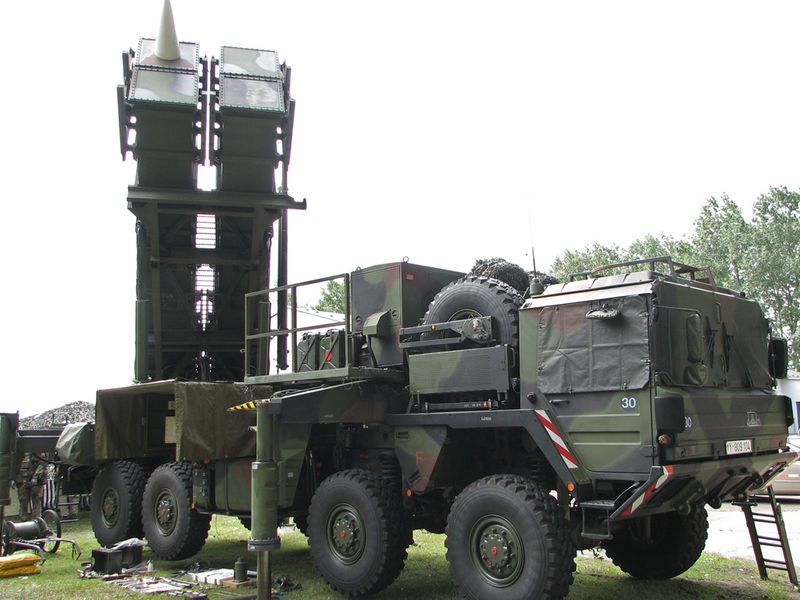
MIM-104 Patriot System of the Luftwaffe - (click to enlarge) |

* Pillaging Africa
China’s increasing investment in Africa has spurred into action other contenders for Africa’s raw materials wealth, not the least being the European Union’s leading nations, France and Germany. Each of these powers seeks to extend its individual hegemony within this greatly underdeveloped continent, in particular in the territory that each once ruled before decolonization took effect.
Indeed, in a race not unlike that of colonial days, Africa, it seems, is once again up for grabs.
EU states, intent on securing new sources of energy in order to lessen their dependence upon Russia, are increasingly looking toward North Africa.
Market monitor RiskCenter.com reported, “The region has for many years been a significant contributor to European gas supplies, but recent deals and current market noises point to this contribution witnessing sizeable growth. … For the EU, North Africa will be a key component of its energy future” (August 15, 2007).
The Chinese have been buying favor with African nations by direct investment in infrastructure—roads, rail, electricity distribution, port development, etc.—to aid in their procurement and shipment of raw materials, especially much-needed oil and gas. By contrast, Germany’s heightened involvement is coming significantly from a different quarter: that of military involvement.
China certainly has the cash for capital investment, but the German-led EU has the regional proximity of its military forces to secure Africa’s raw materials and China’s African assets. It also has the benefit of lingering attachments and interests within much of Africa as a result of its colonial history.
Both the German-dominated EU and China have a huge thirst for energy-based resources. There may yet be a deal done between the two that will eventually block out the U.S. and Britain from access to Africa’s energy wealth.
Reporting on Germany’s involvement in the volatile, oil-rich region of Sudan, German-Foreign-Policy.com observed:
“Following the UN’s decision to deploy troops to Sudan [where China has heavily invested], warmongers in Berlin are pushing for German participation. German foreign-policy specialists from the opposition, as well as from circles close to the ruling cdu party, are calling for Germany showing a presence in the western Sudanese province of Darfur, at least with military observers or high-ranking officers” (August 10, 2007).
Typically, Germany seeks first to penetrate Africa under the umbrella of its allies, in particular the U.S.
“It is, above all, Washington and Berlin who are pushing for a UN-mandated intervention in Darfur and seeking to militarily roll back the influence of the Sudanese central government. Regional secession is not being ruled out” (ibid.).
This is classic German foreign policy. The same strategy worked brilliantly in the Balkan Peninsula, where Germany motivated an illegal war fought largely by its allies, the U.S. and Britain, and gained for the European Union (i.e. Germany) the land hinge between Eastern and Western Europe. Having then ensured the involvement of the German Navy running security for the EU in the Mediterranean, the German-led EU took over Malta, which Italian Prime Minister (then European Commission president) Romano Prodi described as the EU’s stepping stone to Africa.
Now the battle is joined for the further spread south by the EU behemoth.
But it is not only the U.S. that is being played for a patsy to secure German interests in Africa. Berlin is currying the favor of African allies in support of its plans to dominate the raw materials (in particular oil and gas) and cheap labor that are the continent’s greatest economic assets.
“Ghana and Nigeria are playing decisive roles with their participation in the Sudan deployment and are receiving millions in German financial aid, for the maintenance of their troops. Further militarization of the African continent is a direct consequence”
Watch Germany push its influence south of the Mediterranean into Africa, having already, via the EU, virtually taken over Eastern Europe and the Mediterranean, including the island nation of Cyprus (on the doorstep of the Middle East and a short distance from Jerusalem).

Forward to Next Chapter/ . . .
Back to Table of Contents/ . . .
In the public interest.
![]()

